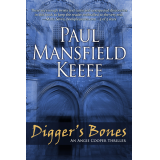Angie Cooper dragged herself out from beneath the warmth of her down comforter with great reluctance. The house felt cold, especially for Pennsylvania in June. Her rose print pajamas were twisted and bunched up around her waist and she left them that way, tripping her way across the clothing strewn floor headed to the bathroom down the hall.
The master bedroom and its en suite bathroom collected dust as Angie slept in the room where she spent much of her childhood and trudged her way to the hallway bathroom instead.
Brooding in the mirror she thought, Why am I such a loser? Her brows furrowed over her pale blue eyes. Four years out of Columbia and she was writing human interest fluff for the Pocono Record, the local newspaper. A double major in archaeology and anthropology flushed down the john, along with her dreams of a fulfilling career.
Her clear acrylic hairbrush made prisms dance on the wall, which she ignored like so many tiny rainbows vying for her attention. Instead she concentrated on untangling strands of her shoulder-length ginger-blonde hair that wove in and out like misery through her life. The blame for her failed career was clearly on her shoulders and she wanted to smash the mirror until glass slivers rained down into the sink.
“You’re an idiot, Angela Cooper,” she said, putting down her brush and staring deep into her own eyes. “Anasazi . . . damn it! You know better than that.”
The phone’s shrill ring distracted her from her depressing reverie. She listened for a few moments before dashing down the hall. It had been nearly two years and yet she still hesitated as if her mother might call out, “I’ll get it.”
Pushing aside the National Geographic with the Mayan ruins on the cover from her nightstand, she lifted the receiver of her pink, circa 1985, princess phone.
“Hello?”
“Angie?”
“Digger, is that you?”
“Thank God . . . thank God, holy shit—”
Tarek “Digger” Rashid, her best and perhaps only friend left in the world of archaeology. She hadn’t heard from him in at least a year, a very long time for him to be out of touch. They were students at Columbia on their first real dig when they met. They hit it off immediately. Digger’s quirky sense of humor kept Angie from becoming too overly serious, she helped him to buckle down and do some of his best work. From then on when Digger found work, so did Angie. They worked digs as a team and gained in reputation by doing so. That was until she screwed it up.
Angie sat down on the bed and uncurled the phone cord with her free hand. “Digger, what’s wrong?”
“Angie, listen to me,” Digger said, “I need you to come to Washington.”
“Washington—?”
“Yeah, I need you to come today. I have to talk to you, it’s urgent.”
After a year out of touch Angie wondered what could be so urgent that Digger would need her to fly to Washington without notice; something was definitely awry. “Digger, what’s going on?”
“Meet me at the CityZen, 6:00 . . . please be there Angie.” He hung up.
Angie made reservations at the Willard InterContinental, her favorite D.C. hotel. She packed enough clothes for a couple of days not sure what Digger had in mind. Fantasies of ceremonial clay pots and hidden chambers played in her mind’s eye, but she knew in her heart those days were over. Besides, Digger’s tone was upsetting and she wondered if he had made some sort of career ending mistake, not unlike herself. Still, her boots and khakis made their way into her suitcase, just in case.
~
The wall of wine, the heavy granite pillars reflected in the stone and wood floors, the cathedral-high ceilings, all added to the CityZen’s light and lively atmosphere. Angie slowly sipped her Apple Martini she ordered while waiting for Digger. She looked good, all five-feet-four-inches of her, dressed in a silky short black skirt—designed to show off her athletic shape—and a classic red v-neck sweater. She hadn’t worn two inch high heel sandals since college; they felt good dangling from her feet.
She almost sat at the bar, more to be seen than anything, but the stools just seemed a bit too high. So instead she sat at a table in the back that had a wonderful view of the place. A smile found its way to her lips for the first time in what seemed like years. That’s when she saw Digger moving quickly across the room, his usual neatly combed black hair tousled, his clothes and jacket in disarray, a Manila folder with its contents spilling out pressed tightly to his chest.
“Digger—”
“Professor Rothschild’s dead.”
“What—?”
“There isn’t much time,” he said as he sat down across from her. “Just listen carefully.” He looked back over his shoulder as if he were expecting someone to be following him.
“You’re scaring me, Digger.” Angie whispered, seeing the tension in his jaw from his tightly clenched teeth.
“Just listen. Remember the kiva at Bandelier?” He continued without waiting for her to answer. “The spot in the wall where we found the hidey-hole? You need to go—”
Suddenly, a thin man wearing a dark blue Armani suit, a blue shirt with its collar unbuttoned, and expensive looking loafers, sat down beside Digger. Digger leaned back pulling the folder closer to his chest, desperation in his eyes. The man’s arms were crossed, his left hand within his jacket, the other holding the opposite elbow. He smiled at Angie, a broad smile that didn’t hide his arrogance. His tufted white hair and black eyes made him look like some sort of bird, a predatory bird.
“Tarek, who’s your lovely friend?” The man asked as his eyes moved up along Angie’s body.
“She has nothing to do with this.”
“Is that right?” he asked, staring at Angie, his right foot bouncing against his crossed leg.
“Do with what?” Angie asked indignantly. “Who the hell are you?”
He twisted his head toward Digger. “She’s got fire. I can see why you’d bring it to her.”
“Bring what to me—?”
Even in the boisterous CityZen Angie heard the faint “pfffaat” of the man’s silencer. It was a sound she was entirely unfamiliar with. She didn’t put it together until she realized Digger’s head had fallen back and to the side and the man was relieving him of his folder. Still, it took catching a glimpse of his pistol before real terror set in.
“So . . . what were you two chatting about?” he asked.
Angie trembled, words caught in her throat as she labored for breath.
He smiled his arrogant smile, baring his teeth at her. He lifted his hand, covered by the Manila folder, onto the table. Her heart pounded loudly in her ears. Her breathing became rapid, nearly out of control.
“I suppose it’s not important really,” he was saying, “I know as much as I need to.”
“Is he okay?” A waiter carrying a tray of drinks startled the gunman. He turned quickly to see who had spoken. Angie took it as a cue to make her escape. She stood, stumbling on a chair, knocking into the waiter, the drinks crashing down upon the table and the gunman. The waiter falling against the table caused the candle to ignite the alcohol. The gunman’s sleeve burst into flames. Angie ran for the door. People began screaming hysterically. An enormous mirror crashed to the ground as she passed; she didn’t hear the muffled shot over the din of the fleeing crowd.
Angie was out the door and into a cab before she could quite grasp what had happened. A throng of patrons erupted from the CityZen in panicked terror. She peered out the back window to glimpse the gunman emerging from the building, crushed by the frenzied wave of people, his predatory eyes following the cab as it sped down the street.








